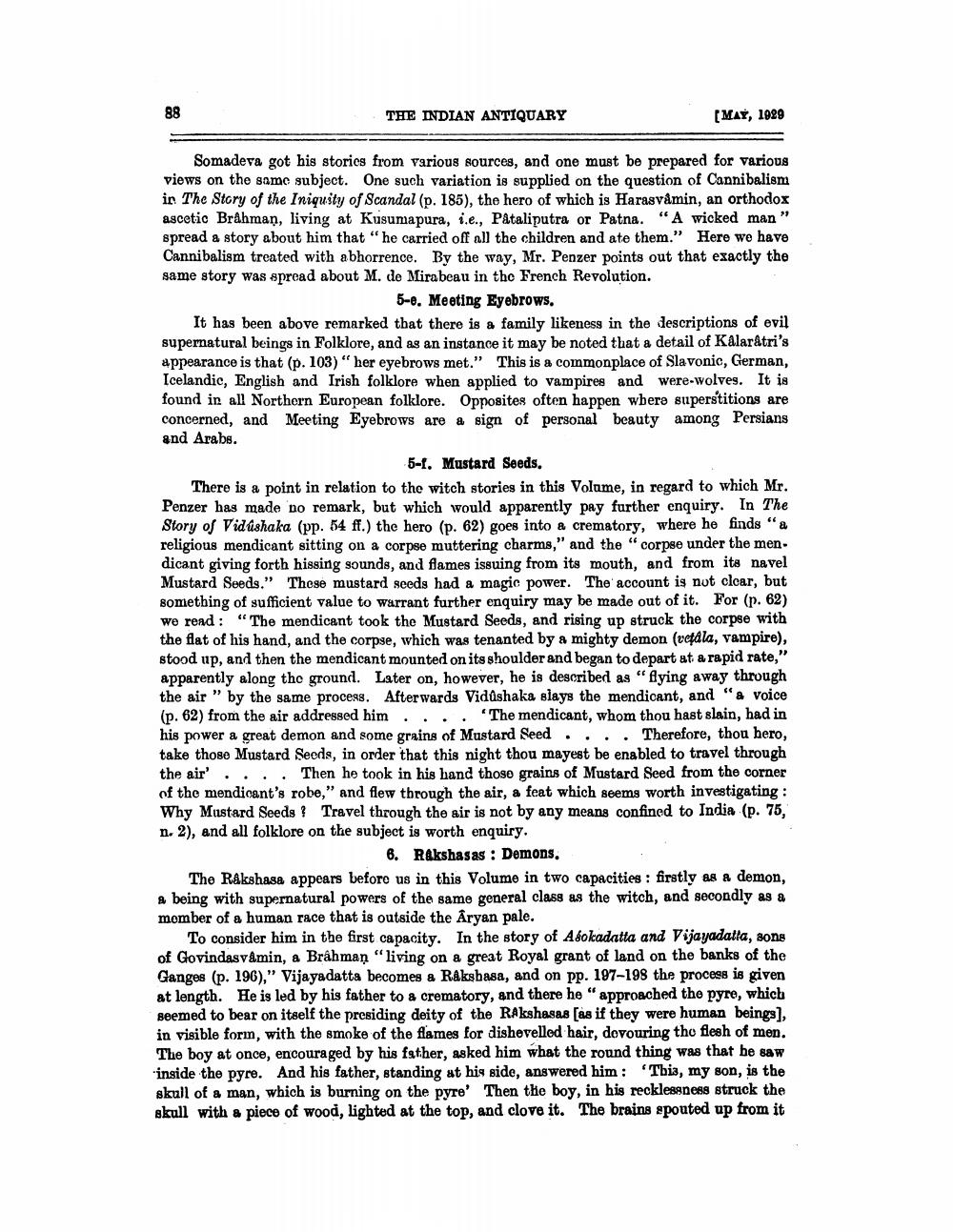________________
88
THE INDIAN ANTIQUARY
[MAT, 1929
Somadeva got his stories from various sources, and one must be prepared for various views on the same subject. One such variation is supplied on the question of Cannibalism in The Story of the Iniquity of Scandal (p. 185), the hero of which is Harasvåmin, an orthodox ascetic Brahman, living at Kusumapura, i.e., Pataliputra or Patna. "A wicked man" spread a story about him that "he carried off all the children and ate them." Here we have Cannibalism treated with abhorrence. By the way, Mr. Penzer points out that exactly the same story was spread about M. de Mirabeau in the French Revolution.
5-e. Meeting Eyebrows. It has been above remarked that there is a family likeness in the descriptions of evil supernatural beings in Folklore, and as an instance it may be noted that a detail of Kalar&tri's appearance is that (p. 103)" her eyebrows met." This is a commonplace of Slavonic, German, Icelandic, English and Irish folklore when applied to vampires and were-wolves. It is found in all Northern European folklore. Opposites often happen where superstitions are concerned, and Meeting Eyebrows are a sign of personal beauty among Persians and Arabs.
5-1. Mustard Seeds. There is a point in relation to the witch stories in this Volume, in regard to which Mr. Penzer has made no remark, but which would apparently pay further enquiry. In The Story of Vidushaka (pp. 54 ff.) the hero (p. 62) goes into a crematory, where he finds "a religious mendicant sitting on a corpse muttering charms," and the "corpse under the men. dicant giving forth hissing sounds, and flames issuing from its mouth, and from its navel Mustard Seeds." These mustard seeds had a magic power. The account is not clear, but something of sufficient value to warrant further enquiry may be made out of it. For (p. 62) we read: "The mendicant took the Mustard Seeds, and rising up struck the corpse with the flat of his hand, and the corpse, which was tenanted by a mighty demon (vetala, vampire), stood up, and then the mendicant mounted on its shoulder and began to depart at a rapid rate," apparently along the ground. Later on, however, he is described as "fying away through the air" by the same process. Afterwards Vidushaka slays the mendicant, and "& Voice (p. 62) from the air addressed him ... The mendicant, whom thou hast slain, had in his power a great demon and some grains of Mustard Seed.... Therefore, thou hero, take those Mustard Seeds, in order that this night thou mayest be enabled to travel through the air' .Then he took in his hand those grains of Mustard Seed from the corner of the mendicant's robe," and flew through the air, a feat which seems worth investigating : Why Mustard Seeds ? Travel through the air is not by any means confined to India (p. 75, n. 2), and all folklore on the subject is worth enquiry.
6. Rakshasas : Demons. The Rakshasa appears before us in this Volume in two capacities : firstly as a demon, a being with supernatural powers of the same general class as the witch, and secondly as a momber of a human race that is outside the Aryan pale.
To consider him in the first capacity. In the story of Abokadatta and Vijayadatta, sons of Govindasvâmin, a Brahman “living on a great Royal grant of land on the banks of the Ganges (p. 196)," Vijayadatta becomes a Raksbasa, and on pp. 197-198 the process is given at length. He is led by his father to a crematory, and there he "approached the pyre, which seemed to bear on itself the presiding deity of the Rakshagas (as if they were human beings], in visible form, with the smoke of the flames for dishevelled hair, dovouring the flesh of men. The boy at once, encouraged by his father, asked him what the round thing was that he saw inside the pyre. And his father, standing at his side, answered him: Tbia, my son, is the skull of a man, which is burning on the pyre' Then the boy, in his recklessness struck the skull with a piece of wood, lighted at the top, and clove it. The brains spouted up from it




